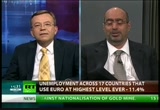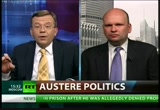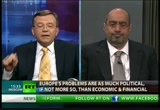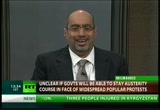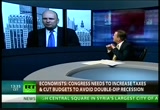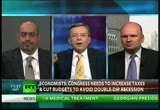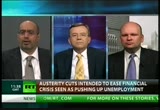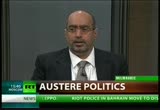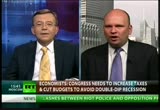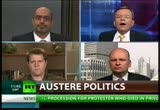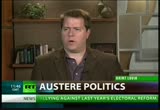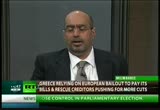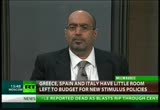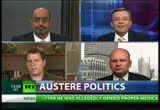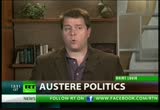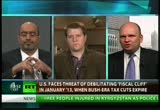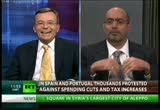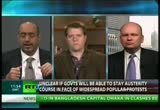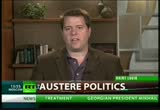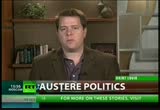tv [untitled] October 3, 2012 7:30am-8:00am EDT
7:30 am
in the morning left with the cost of about forty thousand dollars i should start saving money. and you can. start. to. follow in welcome to cross talk on people about the cruel politics of austerity reeling from one crisis to another the western world has come to the rescue of its banks and financial sectors though the future of both remains uncertain but what about the people of politics and economics been reduced to a contest between democratic government and market preferences. and you can. start. to cross out the politics of austerity i'm joined by jeffrey summers in milwaukee he's an associate professor at the university of wisconsin milwaukee and a visiting faculty member at the stockholm school of economics and in new york we
7:31 am
cross to peter cheer he is the founder of p f market advisors right gentlemen crosswalk rules in effect that means you can jump in anytime you want jeffrey you've been on the program before has austerity gone too far particularly in europe can i stared he create prosperity can a stary create jobs. well it's creating plenty of prosperity for the financial sector i'm not sure for how long this will continue but for common people it's been a disaster and it's been a disaster frankly for forty years i mean we continue to see this kind of cannibalization of the social sector and then driving those. gains up to the top of the in comparing that and this is has to stop the whole system is imploding peter where you jump in on that too much austerity you know i think one i study actually needs to be done in some form i think it's got to take some time the other side of this coin has become every want to talk about oh spending and let's be honest we got into this debt problem because everyone spent money all these things about growth etc all these plans over the last ten years were meant to create growth meant to create jobs in some form or another so somehow governments
7:32 am
are going to miraculously do that i don't think so i think we need to step back i think with one thing we have to do is probably fix the banking system which probably means huge write downs existing shareholders take a beating and start making the people who got us in this trouble the banks in particular bear more of the pain and have less of it go out of the people certainly in the short term if i can say to you so you're saying there should be financial reform banking reform thinking about people ok not just about those institutions because that's what it's been so far. right i think you know there's been this huge denial that the problems at the banks and then every time we get these brief moments where the markets are good they pull back from recapitalizing the banks they really just have to go through recapitalize the banks for some of the weakest ones out it will cause huge losses for shareholders it will cause some people you know at high levels their jobs but i think that's got to be a starting point because debt wipe you wiping out debt wiping out that act what he means you have to have less are sterile and it starts focusing the problems on the
7:33 am
right people instead we do all this to stare at the which makes the banking sector happy but six months later we still have no jobs we have an economy that continues to deteriorate and we have the zombie like bank system that keeps limping along and keeps getting bailed out ok jeffrey. you got to jeffrey jeffrey there's a lot of economists are saying there's not enough austerity you have to keep cutting cutting spending cut spending cut the budgets cut cut cut cut i mean it's a remarkable looking at europe well. well there are always these kinds of one nine hundred thirty s. the like dizzy with success stalinist who want to see more extreme measures imposed or. types who just can't see enough destruction. their appetite is is growing only as they taste more blood and of course this is absurd we can't just keep opposing this austerity i mean what is the end game it is you can continue to keep cutting wages as you continue to keep cutting the social sector and i'm not
7:34 am
talking about protecting inefficiencies i'm all for introducing official says but when you're actually reducing these costs then where does the demand in the economy come from now i would agree with peter we certainly do need to see some radical haircuts be imposed on finance but my concern is with the word reform remembering my friend boris calder lecky who once reported that every time the former soviet union had a reform of the bureaucracy it grew by fifteen percent. i think we we really need to see something very very quite extreme in terms of contraction of the financial sector and just one more comment as randall ray at the university of missouri kansas city and noted in the one nine hundred seventy s. finance had something like fifteen percent of corporate profits in the united states today that share has been roughly forty percent there is just absolutely no justification for this kind of rent seeking off of the rest of the economy you know peter if we if we can go back to you in new york a lot of the austerity issues cut jobs created out of employment actually. right so
7:35 am
i think that's been a problem at the same time let's look at the other and one of my favorite statistics is the average unemployment rate in spain is about twenty two months it's no coincidence that unemployment benefits run out at twenty four months so there's definitely a certain subsector looks like that they wait their twenty two months watching the football and then hey i better go find a job and they find a job and buy one of their buddies gets laid off and goes on his two year semi you know funded vacation so obviously that's a bit of an extreme example but there are problems with the benefits system right it doesn't encourage people to go back to work sometimes it's too you know beneficial that can't necessarily be changed overnight but there's a lot of problems there there's you know if you go to spain right it does not look like an economy with twenty five percent unemployment there's this huge you know black market economy underground economy that has to get pulled back up as well they've got to be paying taxes so there's got to be reformed and whether you want to call it a stereo or not i think someone's got to go through and try and change the system
7:36 am
which unfortunately is almost politically impossible right because it's so hard to get the votes to do that so i think we keep this limber lumbering around and you've got the banks at one side demanding their bailouts the people demanding their bailouts and at some point it's all going to give so unless we are going to get is i can say with you and i think it's really interesting is that you know the people on the ground unemployed people see all the banks bailed out the financial sector bailed out politicians protected i mean i know it's very popular but people say now how about me brooke bail me out and i know i know that's nonsensical on many ways but i can understand how people feel that way. yeah and again i think that's why at least in spain they've got to take this concept of bankia but make it more they've got to get rid of all these weak banks you know there's weak german banks that should've been just shut down years ago and it's them that caused the problem because what happens especially when the government bail outs are there it keeps these weak banks alive and they're willing to do the dumbest lending that is out
7:37 am
there because they already have the government life support they are the ones who basically drag down the whole system they stop capital from going to the right places and it's just become a complete you know grind to a halt and no rational person really wants to participate in this market where the decisions are not being made at a market level they're being made at some centrally planned summit somewhere in belgium it's an interesting what is driving this market preferences or is it just politicians that are afraid to bite the bullet. i don't think a spark of preferences at all i mean we've essentially had our economies restructured by one i mean the financial sector is very well known they have an actual sector's done very well you even said that they've done fine the bankers have done fine. of course and that's what i'm saying i mean they owned the political system as well but if you take a look at the european union i mean the european central bank i mean essentially olds of the economy and by own it i mean they are just proxies for finance but if
7:38 am
you take a look at article one twenty three of the european union charter and to centrally what it does is it turns over credit creation which states used to do to minimize the costs of creating credit for infrastructural investment and it's turned it over to the financial sector which in effect imposes a tax on the rest of the economy because we have to pay an economic rent to these commercial banks are ordered to pay for our infrastructure i mean the system is just an absolute unmitigated disaster and i can't see how we can reform it when essential finance at this point literally owns it i mean they they control it absolutely whether it's the united states or whether it's the european union peter go ahead jump in go ahead yet and it's not just europe i think you know we kind of ignore a lot in the u.s. but the fed now owns forty percent of all treasury bonds that are five years and longer the fed basically is the single largest investor in u.s. treasury bonds it controls the shape of the yield curve all these things that we
7:39 am
used to take as kind of free markets the fed now controls and then they're ingenious they say oh look there's no inflation expectations based on the yield curve yet they're the ones who control the yield curve so i think it's not just europe where you've got the central bank kind of planning everything and trying to create this imaginary system that everyone can get comfortable with that's going on in the u.s. and it's one reason we're seeing so many traditional relationships break down whether it's you know g.d.p. growth versus yields whether it's stock markets versus yields all these things because they're being so manipulated by the central banks means rational investors real people c.e.o.'s of companies don't look at them and take the same conclusions so it's very hard to create policy that creates jobs when no one believes the underlying data anymore ok jeffrey i think i think it's. very interesting is you know i'm living in the country that used to be the soviet union you mention the soviet union and it seems to me a lot of western economies are either their ideologically driven you know i mean they have this idea about an operation an economic operation they don't care if the
7:40 am
patient survives they just have to keep to the procedures oh absolutely i mean they have this dogmatic adherence to a particular ideology and the facts will be selected to fit the support of that theory so it's a travesty i mean we don't have a free market of ideas and especially in economics unfortunately i mean the situation has improved somewhat but still we have dogma trumping the free competition of ideas ok peter looking over the last few years has the financial system changed enough because it seems to me it's just been fixed for their advantage ok not to fix economies. yes i completely agree with that i think one of the more exciting parts i'm finding now is a middle market lending so small to medium sized companies the big banks don't bother with that because they're getting so much money they can just buy mortgages or whatever the feds buy and somewhere in europe they just go and buy these sovereign debt of spain the smaller banks don't get the full support so they're
7:41 am
just struggling to survive and there's a whole middle tier that's left empty and what we're seeing is private equity step in we're seeing pension funds step in worse lowly but surely and creating a new banking system because the fed policy and i think it's somewhat somewhere in europe i think they're a couple years behind because they're still in more crisis mode but it's squeezed out this whole middle market lending small regional lending we're seeing more evidence of your consortiums of people getting together so they can lend to people in their own communities it's you know strange and bizarre but that's the reaction to this big centrally planned policy which has really done nothing to help the middle or smaller class it's all been about keeping the big incumbents in power and same in europe right it's all these policies keep helping the big ones it doesn't allow for true reform it doesn't allow for new banking to come in and i'm sure if they open something up to private equity you can get ten billion equity to create a new bank in spain with l.t.r.
7:42 am
7:45 am
welcome back to crossfire and people will remind you we're talking about the politics of austerity. and now we're joined by our garland in st louis he's a strategic trend analyst and author of future incorporated how businesses can in tissue paper and profit from what's next all right eric thank you for joining us from st louis what about the politics of austerity because it seems to me it's turned into an ideology it's a new religion as i said in the first part of the program no one really cares if the patient if i can use that medical term survives this ideology this methodology go ahead. it's funny you know that whole term austerity is not one i like very much because it has all these punitive connotations as opposed to what it really means which is that we need fiscal policies that make sense and by making sense you can't spend more than you take in for very long everybody with common
7:46 am
sense knows this and all we're saying is that our current systems that are very large and more complex than any of us really know how to manage they're not working very well right now and we're going to have to return to some some commonsense policies and and spend less than we take in now they're calling it austerity like like all of us have done something wrong and well now you're going to get it and so either you either want austerity or you want the other thing which is to continue the impossible forever you know if i could let me go to geoffrey milwaukee i think that's an interesting point because you know there's so many people over the last four years that have been punished greatly punished they didn't do anything wrong ok so why you know austerity and you know you just the thing is to say you're going to have to live poor now this next generation just going to have to live poor that's hard thing to sell politically it's not even good economically go ahead absolutely yes and i think we should continue using the term austerity i don't
7:47 am
think we should gloss over this and try to put a happy face on it you know in the united states we have lots of political spin masters like frank luntz and others who actually try and craft a language that is going to best try and manipulate and to shape and mold a public opinion on these issues i think we should continue calling this austerity it's terribly austere people are suffering terribly it was you know peter at the stockholm school of economics and read some time with my visiting apartment there and in that country we've seen upwards of ten percent of the people have to leave in this massive biblical like exodus i mean it's just absolutely terrible crushing and regarding the unsustainability of the system well yes true it is unsustainable but not for the reasons i think that eric has suggested. what we have to do is to actually increase our tax receipts we need to close down shut down these offshore financial networks that have all of this capital of aiding taxation we have to have a tobin tax on both financial and currency transactions and we need to jack wages
7:48 am
up in line with productivity that's something we haven't done for the past forty years labor has just not received its share of productivity consequently what we've had to do is we've had to rely on credit whether it be in the public sector or in the private sector to purchase all of the goods that we can produce it would be a travesty and i would even say it's the height of stupidity to just try incur tale demand at a time when we're not soaking up all of the productive capacity that we have already you know peter it's interesting to note already noted in this program is that the rich have just gotten richer but i don't see anything coming from them to give something back from a system that's made them so fabulously rich but no they just want to get richer and richer. you know but that's welton really what this country was based on and i think it's how as you progress i think one of the things i look at an industry that failed horribly was the fiber optics business back in two thousand they built all these fiber optics network demand in companies went bankrupt guess what all those
7:49 am
things have been bought up having done that turned out to be one of the greatest things that's one of the few infrastructure projects that's new in the u.s. that actually works and yet it's only through that creative destruction people failed people bought it up people bought it out of bankruptcy and it really grew so i think we do too much to protect existing businesses which don't let other businesses create again it's why we have this hole in middle market lending because so much has been done to prop up the big banks so i think we need some failure we need some creative destruction and then we need support and find ways to create the new businesses the businesses that will be the future in five years ten years and there's not enough that gets done with that and i think that's going to continue to hurt you who want to jump in there and you know at the same peter if i could just interject if i consider just very very quickly here i mean i think that mr chair is right on a very important point here i mean what we need to first do is understand that there is a difference between value creation as profit and economic rent seeking as profit
7:50 am
and we use the term profit today unfortunately to refer to both activities and we absolutely need to put a big barrier a big wall between them so that people understand that there's a big difference again between the al you creation productivity increases and rent seeking off the system and we also need creative destruction is just as good as you know what you're saying and i go there we need financial reform ok v. can spin not creating the right kind of profit for this for economies erick go ahead. or cover financial creative destruction ok fine you know we were talking about we were talking about whether or austerity is a politically desirable thing if people are going to resist it well and we're going to need it eventually anyhow as mr cheer says well you know one of the reasons that it's so politically on viable is that most of our leaders aren't giving us an option as to what comes after it it can't just be we renewed we negotiate the wages and standard of living down for ninety eight percent of the population say too bad
7:51 am
guys we need to do this without saying and you know if it's tough for a few years here's what we're going to have we're going to have we're return to small and local businesses we're going to build infrastructure that allows us to deal with peak oil and climate change and we're going to take care of old people who didn't dignified manner as these new demographic trends come in the next ten to twenty years we're not hearing that from our leadership we're saying we're hearing we need to prop up the institutions that are already here we need to make sure that the big winners who are already winning keep winning oh and by the way you guys need to tighten the belt for a few years and it's no wonder that you're getting protests in lisbon where i wonder if it's not a very good sell ok well it could be an interesting fellow if it continues pete if i go back to new york i mean how do democratic societies go through all of this hero because you know eventually the street is there and i mean if the ballots are doesn't work in the right direction i mean then you could have social chaos and that's in the cards. i completely agree i would have said you know some sort of you
7:52 am
know real riot or social upheaval was off the cards four or five years ago and so i think in europe it's in the cards in greece it's heading that direction in spain where price still another four or five years away in the u.s. it feels like the leaders aren't being responsive they aren't doing the things that are necessary and as you thought employment particular is huge. there is going to be growing discontent and you can't fix it by just giving you know more social benefits you need a real plan that shows these people like ok you're twenty two here is what we can do for the next two years and where will you be when you're thirty years old and i think the system that is now by devolving into this twenty five year old not quite sure what they're going to do you know in the us i think we had an all time peak now of twenty six year olds living at home again and that's just not sustainable and stared he's not going to help but neither is not having a plan we need some sort of plan of where we want to be in two years five years ten years and do something that helps them and maybe we do have to spend
7:53 am
a bit more realizing certain things in the future will have to be more you know for lack of a better word you know jeffrey where do you where does that democracy stand in all of this because a lot of people say why vote because you get the same guy anyway. well precisely i mean it's terribly dangerous and of course we saw alternative solutions advanced in the one nine hundred thirty s. before you know look this reminds me of the one nine hundred eighty s. film groundhog day with bill murray in which every day he woke up repeating the same day with the alarm and we learn nothing from the previous day or from previous history we've gone through this before we've seen this movie before i mean we had a massive increase for instance in productivity in the early twentieth century and the one nine hundred thirty s. what did that lead to will it lead to. unemployment and ultimately an economic crash when matched with financial speculation so what did we do well we actually decreased the number of hours worked and then we seriously curb wall street and now
7:54 am
you know was this just taken as a kind of enlightened. consensus by all of members of society you know the bankers screamed like hell about it but yet they were checked we had of course glass steagall and several other reforms hard reforms that really really curb the power of finance we've reduced the number of hours that people worked and this helped to lay the foundation for the great economic expansion that occurred in the north atlantic europe in the united states and other parts of the world too for the next forty years we've done this before we've seen this yeah what do we know what to do we have to tell him we'll do it do we have the political will to do it this time i agree with jeffrey on that. do we have the political will is the winner in america why are you a. about young people who are cynical about the system you know it's probably because they recognize that politics right now it's all a dialogue between a government which is
7:55 am
a huge size it's huge in the united states it's huge in federal europe and increasingly large you know institutions like banks and very consolidated industries automotive and pharmaceutical there's only a few people at the table and they all have a massive amount of risk there of success at risk now don't get me wrong hundreds of millions of other people also risk very much in their lives but the dialogue that's going on in the capitals of the world is just between these few huge players and it just leaves out so many other people that maybe don't own forty percent of the stock in a giant pharmaceutical company for example or don't own a huge bank and the thing is is that the more we have a dialogue that doesn't include the the teeming millions of venture alee they're going to go somewhere else to to dialogue now old people they just don't send their checks in or they don't have a lot of options young people they come out into the street and we've i think we've gotten away pretty lucky you can see what happened in the arab countries when their
7:56 am
governments refused to dialogue with them for so long eventually they came into the streets and things have not been easy sense we've been very lucky in the united states and europe so far but the longer we have institutions that won't that won't talk to people about what is really happening and they're only going to have you know discussions closed doors that affect only a few of these these private winners essentially ok you know we don't want to give you that the only reason we are going to give you the last social unrest and even the last word about the future of democracy fifteen seconds. i think there's going to be up people and there's going to be on rest until something is done to address the youth and these small people because it's gone too much to helping older people and to the large businesses all right i'm afraid we'll run it i mean as today he was gushing to many thanks to my guest today in new york st louis and in milwaukee and thanks or viewers for watching us here see you next time and remember cross-talk rules. and.
7:57 am
7:58 am
30 Views
Uploaded by TV Archive on

 Live Music Archive
Live Music Archive Librivox Free Audio
Librivox Free Audio Metropolitan Museum
Metropolitan Museum Cleveland Museum of Art
Cleveland Museum of Art Internet Arcade
Internet Arcade Console Living Room
Console Living Room Books to Borrow
Books to Borrow Open Library
Open Library TV News
TV News Understanding 9/11
Understanding 9/11
